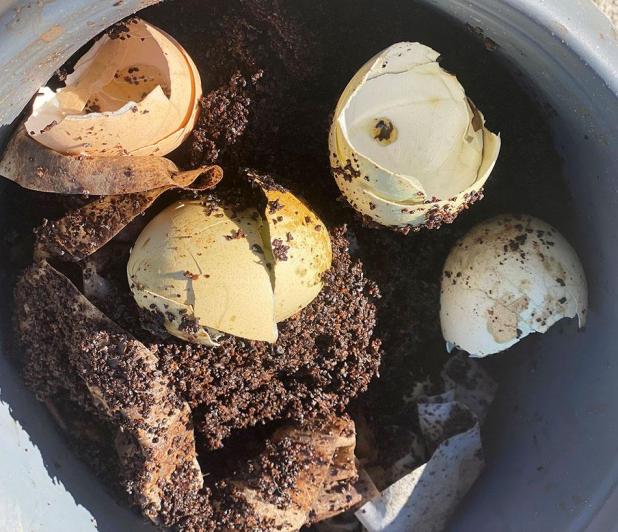
Coffee grounds and eggshells are excellent kitchen scraps to compost for use in the garden.
—LSU AgCenter/Heather Kirk-Ballard
Get It Growing: Garden fertilization on a budget
Fertilizer prices spiked in U.S. markets in late 2021. Now, as we are getting ready for spring planting, the price of fertilizer continues to skyrocket. Farmers and even home gardeners are feeling the pinch and looking for alternative ways to provide nutrients for their gardens.
It is possible to provide nutrients to your plants affordably. Scraps from your kitchen, waste from your yard and byproducts of grazing animals can provide free, natural fertilizers for your plants.
In addition to being economical, organic and do-it-yourself fertilizers play a critical role in environmental stewardship. Leaves and grass clippings are two examples of waste that can be recycled and used in your garden for nutrients. They’re rich in nitrogen, an important source of energy needed for plant growth and part of the chlorophyll molecule that gives plants their green color.
Leaves are another excellent source of nutrients. Live oaks are shedding leaves right now. If you have them, collect leaves for a rich source of trace minerals. They can be tilled into your soil or used as a mulch. As the leaves break down, they provide organic matter that attracts earthworms, which provide castings and additional nutrients. This can improve the tilth of the soil. Tilth is the physical condition of soil and refers to the ease of tillage. Good tilth benefits and promotes seedling emergence and root penetration.
You can use kitchen waste to make compost. Combine scraps with grass clippings and leaves, and you’ve got one rich source of natural fertilizers. Coffee grounds, eggshells and fruit and vegetable peelings are great choices for composting. Sadly, in many homes, we hold produce beyond its useful shelf life. No need to feel guilty about that when you can use those items in your compost and continue the nutrient cycle for your plants.
Coffee grounds are a great source of nutrients that include low levels of nitrogen, phosphorus and potassium along with other trace elements. They also can potentially help lower soil pH due to coffee’s acidity.
Eggshells provide calcium carbonate, also known as lime, and can help raise the pH of soils. Calcium is needed for healthy plant growth and is key to normal root system development in addition to making plants more resistant to insects and disease.
Just as bananas are an excellent source of potassium for us, the peels of bananas provide a source of potassium to plants. Potassium, along with nitrogen and phosphorus, is one of the three essential plant macronutrients. Potassium increases yields and improves the quality of fruits and vegetables while also helping plants resist diseases, insect attacks and cold and drought stresses.
You can also use manure from a variety of sources, including cows, horses and chickens. Each type of manure is high in nitrogen and other nutrients.
There are some risks with using manure if it is not properly aged or composted. First, raw manures can carry bacteria that can be harmful to humans if used in vegetable beds with food that will be eaten. Manure also can carry weed seeds that can be a nuisance in the garden. Raw manure also has high levels of nitrogen, ammonium and salts that can burn plants. Avoid all these problems by composting raw manure before using it.
To be safe, raw manure should be composted for a minimum of 30 days. Ensure it stays at a consistent temperature of 131 degrees Fahrenheit. Turn the compost frequently. Manures purchased at garden centers are safe for use and already have been properly composted.
Another source of nutrients can be from weeds, but do not use them directly in your garden. You don’t want weed seeds germinating and making more of a headache for you. Make a weed “tea” by placing pulled weeds in a 5-gallon bucket. Fill the bucket until it is about one-fourth to one-third full, then add enough water to fill the bucket. Let it sit for a week or two, and once the water turns brown, you can strain the water and pour it over your garden. Be careful not to pour the weeds and their seeds into the garden, as the seeds may still be viable.
By using yard, kitchen and animal wastes, we can add nutrients to our gardens that don’t cost us a dime and help make a positive impact on our environment.
